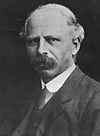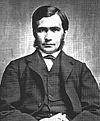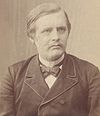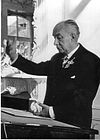- Social liberalism
-
Social liberalism is the belief that liberalism should include social justice. It differs from classical liberalism in that it believes the legitimate role of the state includes addressing economic and social issues such as unemployment, health care, and education while simultaneously expanding civil rights. Under social liberalism, the good of the community is viewed as harmonious with the freedom of the individual.[1] Social liberal policies have been widely adopted in much of the capitalist world, particularly following World War II.[2] Social liberal ideas and parties tend to be considered centrist or centre-left.[3][4][5][6][7]
A reaction against social liberalism in the late twentieth century, often called neoliberalism, led to monetarist economic policies and a reduction in government provision of services. However, this reaction did not result in a return to classical liberalism, as governments continued to provide social services and retained control over economic policy.[8]
The term "social liberalism" is often used interchangeably with "modern liberalism".[9] The Liberal International is the main international organisation of liberal parties, which include, among other liberal variants, social liberal parties. It affirms the following principles: human rights, free and fair elections and multiparty democracy, social justice, tolerance, social market economy, free trade, environmental sustainability and a strong sense of international solidarity.[10]
Contents
Origins
Main article: History of liberalismUnited Kingdom
By the end of the nineteenth century, the principles of classical liberalism were challenged by downturns in economic growth, a growing perception of the evils of poverty, unemployment and relative deprivation present within modern industrial cities, and the agitation of organized labour. The ideal of the self-made individual, who through hard work and talent could make his or her place in the world, seemed increasingly implausible. A major political reaction against the changes introduced by industrialization and laissez-faire capitalism came from conservatives concerned about social balance, although socialism later became a more important force for change and reform. Some Victorian writers—including Charles Dickens, Thomas Carlyle, and Matthew Arnold—became early influential critics of social injustice.[11]
John Stuart Mill contributed enormously to liberal thought by combining elements of classical liberalism with what eventually became known as the new liberalism. The new liberals tried to adapt the old language of liberalism to confront these difficult circumstances, which they believed could only be resolved through a broader and more interventionist conception of the state. An equal right to liberty could not be established merely by ensuring that individuals did not physically interfere with each other, or merely by having laws that were impartially formulated and applied. More positive and proactive measures were required to ensure that every individual would have an equal chance of success.[12]
In the late nineteenth century and early twentieth century, a group of British thinkers, known as the New Liberals, made a case against laissez-faire classical liberalism and argued in favor of state intervention in social, economic, and cultural life. The New Liberals, which included intellectuals like T.H. Green, L.T. Hobhouse, and John A. Hobson, saw individual liberty as something achievable only under favorable social and economic circumstances.[3] In their view, the poverty, squalor, and ignorance in which many people lived made it impossible for freedom and individuality to flourish. New Liberals believed that these conditions could be ameliorated only through collective action coordinated by a strong, welfare-oriented, and interventionist state.[13]
Ultimately, the Liberal governments of Henry Campbell-Bannerman and H.H. Asquith, especially thanks to Chancellor of the Exchequer and later Prime Minister, David Lloyd George, established the foundations of the welfare state in the UK before the First World War. The comprehensive welfare state built in the UK after the Second World War, although largely accomplished by the Labour Party, was significantly designed by two Liberals—John Maynard Keynes, who laid the economic foundations, and William Beveridge, who designed the welfare system.[3]
Germany
In late nineteenth century Germany, left-liberals established trade unions in order to help workers improve working and economic conditions. Leading left-liberals, such as Lujo Brentano, established the Social Policy Association in 1873 to promote social reform. The main objectives of the left-liberals were free speech, freedom of assembly, free trade, representative government, equal and secret suffrage, and protection of private property, although they were strongly opposed to the welfare state, which they called State Socialism. Friedrich Naumann, who was an Association member, later established the National Social Union, which attempted to combine bourgeois nationalism with proletarian socialism. The new group advocated, among other things, increased social welfare legislation, the right to strike, and profit-sharing in industry. Although the party was unable to win any seats and soon dissolved, the theories it developed would remain influential in German liberalism.
While some writers describe Germany's left-liberalism as social liberalism, others only apply the term to the policies of the National Social Union. The main left-liberal parties in Germany were the German Progress Party during the German Empire and the German Democratic Party during the Weimar Republic. The Free Democratic Party represents liberalism in modern Germany. The term left-liberal contrasted these parties with the more conservative liberals, in particular the right-wing of the National Liberal Party, which allied itself with the Conservatives.[14][15][16]
France
In France, social liberal theory was developed in the Third Republic by solidarist thinkers, including Alfred Fouillée and Émile Durkheim, who were inspired by sociology and influenced radical politicians like Léon Bourgeois. They explained that a greater division of labor caused greater opportunity and individualism, but it also inspired a more complex interdependence. They argued that the individual had a debt to society, promoting progressive taxation to support public works and welfare schemes. However, they wanted the state to coordinate rather than to manage, and they encouraged cooperative insurance schemes among individuals. Their main objective was to remove barriers to social mobility rather than create a welfare state.[17]
United States
In the 1870s and the 1880s, the American economists Richard Ely, John Bates Clark, and Henry Carter Adams—influenced both by socialism and the Evangelical Protestant movement—castigated the conditions caused by industrial factories and expressed sympathy towards labor unions. None, however, developed a systematic political philosophy, and they later abandoned their flirtations with socialist thinking. In 1883, Lester Frank Ward published the two-volume Dynamic Sociology and formalized the basic tenets of social liberalism while at the same time attacking the laissez-faire policies advocated by Herbert Spencer and William Graham Sumner. The historian Henry Steele Commager ranked Ward alongside William James, John Dewey, and Oliver Wendell Holmes and called him the father of the modern welfare state.[18] Writing from 1884 until the 1930s, John Dewey—an educator influenced by Hobhouse, Green, and Ward—advocated socialist methods to achieve liberal goals. Some social liberal ideas were later incorporated into the New Deal,[19] which developed as a response to the Great Depression.
Implementation
The welfare state grew gradually and unevenly from the late nineteenth century, but became fully developed following the Second World War, along with the mixed market economy. Also called "embedded liberalism", social liberal policies gained broad support across the political spectrum, because they reduced the disruptive and polarizing tendencies in society, without challenging the capitalist economic system. Business accepted social liberalism in the face of widespread dissatisfaction with the boom and bust cycle of the earlier economic system, and because it seemed to them to be a lesser evil than more left-wing modes of government. Social liberalism was characterized by cooperation between big business, government and labor unions. Government was able to assume a strong role because its power had been strengthened by the wartime economy. However the extent to which this occurred varied considerably among Western democracies.[20]
United Kingdom
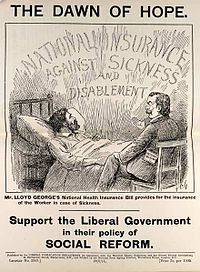 British leaflet from the Liberal Party expressing support for the National Health Insurance Act of 1911. The legislation provided benefits to sick and unemployed workers, marking a major milestone in the development of social welfare.
British leaflet from the Liberal Party expressing support for the National Health Insurance Act of 1911. The legislation provided benefits to sick and unemployed workers, marking a major milestone in the development of social welfare.
The first notable implementation of social liberal policies occurred under the Liberal Party in Britain from 1906 until 1914. These initiatives became known as the Liberal reforms. The main elements included pensions for poor elderly people, health, sickness, and unemployment insurance based on earlier programs in Germany, and the establishment of labour exchanges. These changes were accompanied by progressive taxation, particularly in the People's Budget of 1909. The old system of charity—relying on the Poor laws and supplemented by private charity, public co-operatives, and private insurance companies—was in crisis, giving the state added impetus for reform. The Liberal Party caucus elected in 1906 also contained more professionals, including academics and journalists, sympathetic to social liberalism. The large business owners had mostly deserted the Liberals for the Conservatives, the latter becoming the favorite party for commercial interests. The reforms were regularly opposed by both business interests and trade unions. Liberals most identified with these reforms were the prime minister H. H. Asquith, John Maynard Keynes, David Lloyd George (especially as Chancellor of the Exchequer), Winston Churchill (as President of the Board of Trade) in addition to the civil servant William Beveridge.[21]
Germany
Alexander Ruestow, a German economist, first proposed the German version of economic social liberalism. In 1932, speaking at the Social Policy Association, he applied the label "neoliberalism" to this kind of social liberalism, although that term now features a different meaning than the one mentioned by Ruestow. Ruestow wanted an alternative to socialism and to the conservative economics developed in the German Empire. In 1938, Ruestow met with a variety of economic thinkers—including the likes of Ludwig von Mises, Friedrich von Hayek, and William Roepke—to determine how liberalism could be renewed. Ruestow advocated a strong state to enforce free markets and state intervention to correct market failures. However, Mises argued that monopolies and cartels operated because of state intervention and protectionism, and claimed that the only legitimate role for the state was to abolish barriers to market entry. He viewed Ruestow's proposals as negating market freedom and saw them as similar to socialism.[22]
Following the Second World War, "neoliberalism", now usually called ordoliberalism or the Social Market Economy, was adopted by the West German government under Ludwig Erhard, who was the economics minister and later became the Chancellor. Price controls were lifted and free markets were introduced. While these policies are credited with Germany's post-war economic recovery, the welfare state, which had been established under Bismarck, became increasingly costly.[22]
Rest of Europe
The post-war governments of other countries in Western Europe also followed social liberal policies. These policies were implemented primarily by Christian Democrats and Social Democrats, as liberal parties in Europe declined in strength from their peak in the nineteenth century.[23]
United States
American political discourse resisted this social turn in European liberalism. While the economic policies of the New Deal appeared Keynesian, there was no revision of liberal theory in favor of greater state initiative. America lacked an effective socialist movement, however, New Deal policies often appeared radical and were attacked by the right. The separate development of modern liberalism in the United States is often attributed to American exceptionalism, which kept mainstream American ideology within a narrow range.[24]
Reversal
Following economic problems in the 1970s, social liberal thought underwent some transformation. Keynesian economic management was seen as interfering with the free market while increased welfare spending that had been funded by higher taxes prompted fears of lower investment, lower consumer spending, and the creation of a "dependency culture." Trade unions often caused high wages and industrial disruption, while full employment was regarded as unsustainable. Writers such as Milton Friedman and Samuel Brittan, who were influenced by Friedrich Hayek, advocated a reversal of social liberalism. Their policies, which are often called neoliberalism, had a significant influence on Western politics, most notably on the governments of UK Prime Minister Margaret Thatcher and US President Ronald Reagan, who pursued policies of deregulation of the economy and reduction in spending on social services.[8]
Part of the reason for the collapse of the social liberal coalition was a challenge in the 1970s from financial interests that could operate independently of national governments. Another cause was the decline of organized labor which had formed part of the coalition but was also a support for left-wing ideologies challenging the liberal consensus. Related to this was the decline of working class consciousness and the growth of the middle class. The push by the United States, which had been least accepting of social liberalism, for trade liberalization further eroded support.[25]
Active social liberal parties and organizations
In Europe, social liberal parties tend to be small or medium-sized centrist and center-left parties.[26] Examples of successful European social liberal parties, which have participated in government coalitions at national or regional levels, are the Liberal Democrats in the United Kingdom, D66 in the Netherlands, and the Danish Social Liberal Party in Denmark. In continental European politics, social liberal parties are integrated in the ALDE group of the European Parliament, which is the third biggest group at the parliament and includes both social liberal parties and market liberal parties.[27]
Giving an exhaustive list of social liberal parties worldwide is difficult, largely because political organisations are not always ideologically pure. Party ideologies often change over time. However, the following parties and organisations are usually accepted by peers[nb 1] or scholars as following social liberalism as a core ideology.
- Åland: Åland Centre, Liberals for Åland
- Australia: Australian Democrats[28]
- Belgium: Open Flemish Liberals and Democrats
- Canada: Liberal Party of Canada[29]
- Croatia: Croatian People's Party - Liberal Democrats, Istrian Democratic Assembly[30]
- Denmark: Danish Social Liberal Party[26][30][31][32][33]
- Estonia: Estonian Centre Party
- Faroe Islands: Self-Government Party[30]
- Finland: Centre Party, Swedish People's Party
- France: Left Radical Party[30], Democratic Movement[34][30], Radical Party
- Greenland: Democrats[30]
- Iceland: Liberal Party[35]
- Italy: Alliance for Italy, Italian Radicals, Italian Republican Party
- Luxembourg: Democratic Party[26]
- Netherlands: Democrats 66[26][30][31], GreenLeft[36]
- Norway: Liberal Party of Norway[37][30][38][39]
- Paraguay: Authentic Radical Liberal Party[40]
- Philippines: Liberal Party[41]
- Poland: Democratic Party, Palikot's Movement[30]
- Portugal: Movimento Liberal Social[42]
- Puerto Rico: Popular Democratic Party
- Russia: Russian Democratic Party "Yabloko"[43][30][44]
- Senegal: Senegalese Democratic Party[45]
- Serbia: Liberal Democratic Party[46][47]
- Slovenia: Liberal Democracy of Slovenia[7], Zares[48][30]
- Spain: Union, Progress and Democracy
- South Africa: Democratic Alliance
- Suriname: Democratic Alternative '91
- Sweden: Centre Party[49][50], Liberal People's Party[51][50][52]
- Switzerland: Green Liberal Party
- Tunisia: Social Liberal Party[53]
- Ukraine: Yulia Tymoshenko Bloc
- United Kingdom: Liberal Democrats[26][31][54], Alliance Party of Northern Ireland
- United States: Democratic Party[55][56]
Notable social liberal thinkers
This list presents some notable scholars and politicians who are generally considered as having made significant contributions to the evolution of social liberalism as a political ideology:
- Jeremy Bentham[3] (1748–1832)
- John Stuart Mill[3][9][57][58] (1806–1873)
- Thomas Hill Green[3][9][59][60][61] (1836–1882)
- Lester Frank Ward (1841–1913)
- Lujo Brentano[9] (1844–1931)
- Bernard Bosanquet[60] (1848–1923)
- Woodrow Wilson[5] (1856–1924)
- Émile Durkheim[62][63][64] (1858–1917)
- John Atkinson Hobson[3][59][60][61] (1858–1940)
- John Dewey[3][5] (1859–1952)
- Friedrich Naumann[65][66][67] (1860–1919)
- Gerhard von Schulze-Gaevernitz[9] (1864–1943)
- Leonard Trelawny Hobhouse[3][9][59][60][61] (1864–1929)
- William Beveridge[3][59] (1879–1963)
- Hans Kelsen[5] (1881–1973)
- John Maynard Keynes[3][5][59] (1883–1946)
- Carlo Rosselli[58] (1899–1937)
- Bertil Ohlin[68][69] (1899–1979)
- Piero Gobetti[58] (1901–1926)
- Guido Calogero[58] (1904–1986)
- Isaiah Berlin[5] (1909–1997)
- Norberto Bobbio[5][58] (1909–2004)
- Miguel Reale[70][71] (1910–2005)
- John Rawls[3][57][72][73] (1921–2002)
- Don Chipp[28] (1925–2006)
- Karl-Hermann Flach[74] (1929–1973)
- Vlado Gotovac[75] (1930–2000)
- Richard Rorty [76] (1931–2007)
- Ronald Dworkin[57][58][73] (* 1931)
- Amartya Sen[57][77][78] (* 1933)
- José G. Merquior[5][79] (1941–1991)
- Bruce Ackerman[57][73] (* 1943)
- Martha Nussbaum[77] (* 1947)
- Fernando Savater[77] (* 1947)
- Paul Krugman[80] (* 1953)
- Dirk Verhofstadt[77] (* 1955)
See also
Notes
- ^ Liberal International, ELDR, CALD, Africa Liberal Network, RELIAL or European Liberal Forum
References
- General
- Adams, Ian. Political ideology today. Manchester: Manchester University Press, 2001. ISBN 0 7190 6019 2
- De Ruggiero, Guido. The history of European liberalism. Boston: Beacon Press, 1959.
- Faulks, Keith. Political sociology: a critical introduction. Edinburgh: Edinburgh University Press, 1999. ISBN 0 7486 1356 0
- Feuchtwanger, E.J. Democracy and empire: Britain 1865-1914. London: Edward Arnold Publishers Ltd., 1985. ISBN 0-7131-6162-0
- Richardson, James L. Contending liberalisms in world politics. London: Lynne Rienner Publishers, Inc., 2001. ISBN 1-55587-915-2
- Slomp, Hans. European politics Into the twenty-first century: integration and division. Westport: Praeger Publishers, 2000. ISBN 0-275-96814-6
- Specific
- ^ The history of European liberalism (1959), Guido De Ruggiero, pp. 155–157
- ^ Fauks, Keith. Political Sociology: A Critical Introduction. Edinburgh University Press, 1999, page 73
- ^ a b c d e f g h i j k l Adams, Ian (2001). Political Ideology Today (Politics Today). Manchester: Manchester University Press. ISBN 0719060206.
- ^ Slomp, Hans (2000). European Politics Into the Twenty-First Century: Integration and Division. Westport: Greenwood Publishing Group. ISBN 0275968146.
- ^ a b c d e f g h Liberalism in Modern Times: Essays in Honour of Jose G. Merquior. Budapest: Central European University Press. 1996. 185866053X.
- ^ Hombach, Bodo (2000). The politics of the new centre. Wiley-Blackwell. ISBN 9780745624600. http://eu.wiley.com/WileyCDA/WileyTitle/productCd-074562460X.html.
- ^ a b Women's access to political power in post-communist Europe. Oxford: Oxford University Press. 2003. ISBN 9780199246854. http://www.oup.com/us/catalog/general/subject/?cp=25211&ci=9780199246854.
- ^ a b Fauks, Keith. Political Sociology: A Critical Introduction. Edinburgh University Press, 1999, pages 71–75
- ^ a b c d e f Richardson, James L. (2001). Contending Liberalisms in World Politics: Ideology and Power. Colorado: Lynne Rienner Publishers. 155587939X.
- ^ "The International — Liberalism". Liberal International. http://www.liberal-international.org/editorial.asp?ia_id=508. Retrieved 2009-04-26.
- ^ Richardson, pp. 36–37
- ^ Eatwell, Roger; Wright, Anthony (1999). Contemporary political ideologies. Continuum International Publishing Group. ISBN 9780826451736.
- ^ The Routledge encyclopaedia of philosophy, p.599
- ^ Contending liberalisms in world politics (2001) James L. Richardson, p. 37
- ^ Liberal Democrats in the Weimar Republic: The History of the German Democratic Party and the German State Party (1985) Bruce B. Frye, p 10
- ^ The Democratic Movement in Germany, 1789–1914 (1976) John L. Snell, p. 304-334
- ^ Contemporary political ideologies (1999) Roger Eatwell, Anthony Wright, pp. 35–36
- ^ Commager, Henry Steele, ed.; Lester Ward and the Welfare State. New York: Bobbs-Merrill, 1967
- ^ Richardson, pp. 38–41
- ^ Richardson, pp. 137-138
- ^ Feuchtwanger, pp. 273-317
- ^ a b Oliver Marc Hartwich: Neoliberalism: The Genesis of a Political Swearword
- ^ Adams, p. 32
- ^ Contending liberalisms in world politics: ideology and power (2001), James L. Richardson, pp. 38–41 [1]
- ^ Richardson, pp. 138-139
- ^ a b c d e Kirchner, Emil (2000). Liberal parties in Western Europe. Cambridge University Press. pp. 356–7. ISBN 9780521323949.
- ^ "ALDE National Delegations". ALDE Group in the European Parliament. 2010. http://www.alde.eu/en/about-us/national-delegations/. Retrieved 17 February 2010.
- ^ a b "The Third Team: A brief history of the Australian Democrats after 30 years" (PDF). Australian Democrats. 2007. http://www.democrats.org.au/docs/2007/4_History.pdf. Retrieved 2009-04-05.
- ^ Johnson, David (2002). Thinking government. Peterborough: Broadview Press. ISBN 1-551-11319-8.
- ^ a b c d e f g h i j k Nordsieck, Wolfram. "Parties and Elections in Europe". http://parties-and-elections.de/. Retrieved 2010-12-31.
- ^ a b c Marks, Gary and Wilson, Carole (July 2000). "The Past in the Present: A Cleavage Theory of Party Response to European Integration" (PDF). British Journal of Political Science 30 (3): 433–459. doi:10.1017/S0007123400000181. http://www.utdallas.edu/~cjwilson/prof/BJPS00.pdf.
- ^ Madsen, Tomas Bech (Autumn 2007). "Radicalis and Liberalis in Denmark" (PDF). Journal of Liberal Democrat History. http://www.liberalhistory.org.uk/uploads/56_Autumn_2007.pdf.
- ^ Møller, Thorkild; Albrectsen, Anne-Birgitte (2002). "Facts About Det Radikale Venstre" (PDF). Det Radikale Venstre. http://www.radikale.dk/aftestning/Upload/Filer/FactsAboutTheDanishSocialLiberalParty.pdf. Retrieved 2009-04-08.
- ^ NSD, European Election Database
- ^ NSD, European Election Database
- ^ [http: http://www.dehelling.net/artikel/280/ "Vrijzinnig links"]. Femke Halsema. http: http://www.dehelling.net/artikel/280/. Retrieved 2011-06-22.
- ^ NSD, European Election Database
- ^ Wika, Franziska (2007-07-20). "Liberal – ikke liberalist" (in Norwegian). Venstre. http://www.venstre.no/nordland/vefsn/artikkel/5298. Retrieved 2009-04-06.
- ^ "Venstre — The Liberal Party of Norway". Venstre. 2007-08-03. http://www.venstre.no/print.php?article=981. Retrieved 2009-04-06.
- ^ Gastil, Raymond (2001). Freedom in the World. Piscataway: Transaction Publishers. ISBN 0-765-80101-9.
- ^ "The Liberal Vision". Liberal Party of the Philippines. http://www.liberalparty.ph/platform/vision.htm. Retrieved 2009-04-06.
- ^ "European Liberal Forum — Member Organisations". European Liberal Forum. http://www.liberalforum.eu/index.php/about_members.html. Retrieved 2009-04-08.
- ^ European Forum for Democracy and Solidarity
- ^ Kulik, Anatoly; Pshizova, Susanna (2005). Political parties in post-Soviet space: Russia, Belarus, Ukraine, Moldova, and the Baltics. Greenwood Publishing Group. ISBN 9780275973445.
- ^ Mamadou, Lamine (2007-11-16). "Statement of the delegation of the PDS" (PDF). PDS. http://www.liberal-international.org/contentFiles/files/Lamine%20BA.pdf. Retrieved 2009-04-06.
- ^ LDP.rs
- ^ BLIC.rs
- ^ NSD, European Election Database
- ^ "Annemie Neyts congratulates Folkpartiet and Centerpartiet in Sweden". ELDR. 2009-09-30. http://eldr.org/modules.php?name=News&file=article&sid=892. Retrieved 2009-04-06.[dead link]
- ^ a b "The Swedish parliament (Rigsdag)". Liberal Politological Institute. http://www.lpi-bg.org/?page=eu§ion=cnr&id=84&lng=en. Retrieved 2009-04-08.
- ^ NSD, European Election Database
- ^ "Folkpartiet: The Liberal Party of Sweden" (PDF). Folkpartiet. 2006. http://www.folkpartiet.se/Pages/90075/Engelska.pdf. Retrieved 2009-04-08.
- ^ "Sister Parties". Liberal Democrats. http://www.libdems.org.uk/international/sister-parties. Retrieved 2009-04-08.
- ^ Hargreaves, Jeremy (Autumn 2007). "The Liberal Democrats today" (PDF). Journal of Liberal Democrat History. http://www.liberalhistory.org.uk/uploads/56_Autumn_2007.pdf.
- ^ Grigsby, Ellen (2008). Analyzing Politics: An Introduction to Politics Science. Florence: Cengage Learning. pp. 106–7. ISBN 0495501123. "Its liberalism is for the most part the later version of liberalism—modern liberalism."
- ^ Arnold, N. Scott (2009). Imposing values: an essay on liberalism and regulation. Florence: Oxford University Press. pp. 3. ISBN 0495501123. "Modern liberalism occupies the left-of-center in the traditional political spectrum and is represented by the Democratic Party in the United States."
- ^ a b c d e Cardoso Rosas, João (2008). "Socialismo ou liberalismo social?". DiarioEconomico.com. http://diarioeconomico.sapo.pt/edicion/diarioeconomico/opinion/columnistas/pt/desarrollo/1123500.html. Retrieved 2008-05-21.[dead link]
- ^ a b c d e f Carlos Bresser-Pereira, Luiz (2003). Building the Republican State. Oxford: Oxford University Press. ISBN 9780199261185. http://www.us.oup.com/us/catalog/general/?view=usa&cp=25347&ci=9780199261185.
- ^ a b c d e Meadowcroft, John (Autumn 2000). "The Origins of Community Politics" (PDF). Journal of Liberal Democrat History. http://www.liberalhistory.org.uk/uploads/28_meadowcroft_the_origins_of_community_politics.pdf.
- ^ a b c d The new liberalism: reconciling liberty and community. Cambridge: Cambridge University Press. 2001. ISBN 9780521794046. http://www.cambridge.org/catalogue/catalogue.asp?isbn=0521794048.
- ^ a b c "James Hobson". http://www.liberal-international.org/editorial.asp?ia_id=682. Retrieved 2008-05-19.
- ^ Merquior, J.G. (1991). Liberalism Old and New. Boston: Twayne Publishers. ISBN 0805786279.
- ^ Seidman, Steven (2004). Contested knowledge: social theory today. Malden, MA: Wiley-Blackwell. ISBN 9780631226710.
- ^ W. Russell, James (2006). Double standard: social policy in Europe and the United States. Rowman & Littlefield. ISBN 9780742546936.
- ^ Thompson, Alastair (2000). Left Liberals, the State, and Popular Politics in Wilhelmine Germany. Oxford: Oxford University Press. ISBN 9780198205432. http://www.oup.com/us/catalog/general/?cp=24301&view=usa&ci=0198205430.
- ^ F. Biagini, Eugenio (2002). Citizenship and Community: Liberals, Radicals and Collective Identities in the British Isles, 1865–1931. Cambridge: Published by Cambridge University Press. p. 228. ISBN 9780521893602. http://www.cambridge.org/catalogue/catalogue.asp?isbn=0521893607.
- ^ Jews and Other Germans: Civil Society, Religious Diversity, and Urban Politics in Breslau, 1860–1925. Wisconsin: University of Wisconsin Press. 2008. ISBN 9780299226947.
- ^ Bertil Ohlin: a centennial celebration, 1899–1999. Cambridge: MIT Press. 2002. ISBN 9780262062282. http://mitpress.mit.edu/catalog/item/default.asp?ttype=2&tid=8800.
- ^ Klausen, Jytte (2001). War and Welfare: Europe and the United States, 1945 to the Present. Palgrave Macmillan. ISBN 9780312238834.
- ^ "Espaço Cultural Miguel Reale" (in Portuguese). Jornal da Universidade de São Paulo. Universidade de São Paulo. 2000. Archived from the original on 2007-08-25. http://espacoculturalmiguelreale.blogspot.com/2007/08/entrevista-concedida-pelo-prof-reale-ao.html. Retrieved 2009-04-05.
- ^ Reale, Miguel (2000) (in Portuguese). Crise do capitalismo e crise do Estado. São Paulo: Senac. ISBN 9788573591415.
- ^ Watson, Graham (Spring 1998). "The Two Davids" (PDF). Journal of Liberal Democrat History. http://www.liberalhistory.org.uk/uploads/18_watson_the_two_davids.pdf.
- ^ a b c Vincent, Andrew (2007). The Nature of Political Theory. Oxford: Oxford University Press. ISBN 9780199297955.
- ^ Flach, Karl-Hermann (1984). Noch eine Chance für die Liberalen. Frankfurt am Main: Fischer S. Verlag GmbH. ISBN 978-3100210012.
- ^ Gotovac, Vlado (1996). In Defence of Freedom: Zagreb 1971–1996. Zagreb: Matica hrvatska; Croatian PEN Centre. p. 11. ISBN 953-150-066-5.
- ^ Rodriguez, Ángel Rivero (1993). "Liberalismo, democracia y pragmatismo" (PDF). Isegoría (8). http://bddoc.csic.es:8080/basisbwdocs_rdisoc/rev0672/1993_8_49-64.pdf.
- ^ a b c d Verhofstadt, Dirk. "Liberalism is the best Cure for Poverty". http://www.liberales.be/cgi-bin/en/showframe.pl?essay&verhofstadtucos. Retrieved 2008-08-17.
- ^ Fotopoulos, Takis (October 2004). "Why an Inclusive Democracy? The multidimensional crisis, globalisation and inclusive democracy". The International Journal of Inclusive Democracy 1 (1). http://www.inclusivedemocracy.org/journal/vol1/vol1_no1_why.htm. Retrieved 2008-05-21.
- ^ Tosto, Milton (2005). The meaning of liberalism in Brazil. Lanham: Lexington Books. ISBN 9780739109861. http://www.lexingtonbooks.com/Catalog/SingleBook.shtml?command=Search&db=^DB/CATALOG.db&eqSKUdata=0739109855.
- ^ Krugman, Paul (2007). Conscience Of A Liberal. New York: Ww Norton & Co. ISBN 9780141035772.
Further reading
- Green, Thomas Hill (2006). Lectures on the Principles of Political Obligation. New Jersey: The Lawbook Exchange. ISBN 1584776145.
- Hobhouse, L. T. (1994). Liberalism and Other Writings. Cambridge: Cambridge University Press. ISBN 0521437261.
- Hobson, John Atkinson (2000). The Crisis of Liberalism: New Issues of Democracy. Delaware: Adamant Media Corporation. ISBN 1421227819.
- Martin, Keith D. (2010). A Liberal Mandate: Reflections on our Founding Vision and Rants on how we have Failed to Achieve it. Silver Spring, MD: Weit Press. ISBN 978-0-578-04365-4.
- Merquior, J.G. (1991). Liberalism Old and New. Cambridge: Twayne Publishers. ISBN 0805786279.
- Mill, John Stuart (1989). 'On Liberty' and Other Writings. Cambridge: Cambridge University Press. ISBN 0521379172.
- Rawls, John (2005). A Theory of Justice. Harvard: Harvard University Press. ISBN 0674017722.
- Rawls, John (2005). Political Liberalism. New York: Columbia University Press. ISBN 0231130899.
- Simhony, Avital; Weinstein, David (2001). The New Liberalism: Reconciling Liberty and Community. Cambridge: Cambridge University Press. ISBN 0521794048.
Categories:- Left-wing politics
- Liberalism
- Political ideologies
- Political culture
Wikimedia Foundation. 2010.


